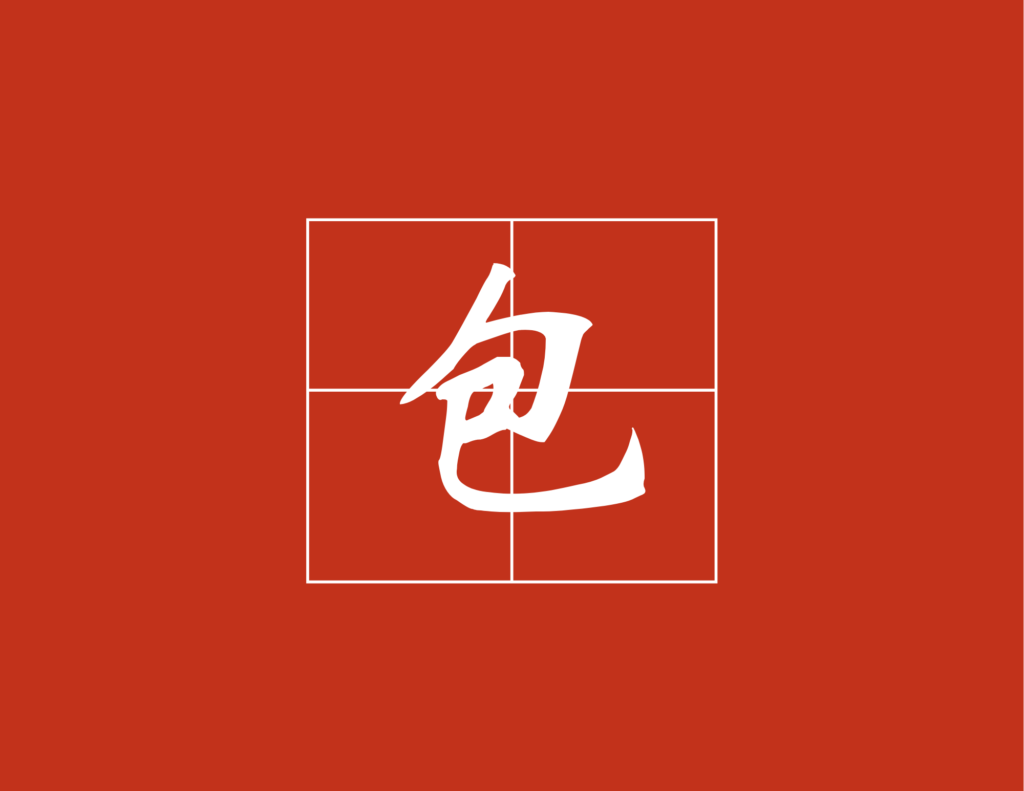The character “包” holds a significant place in Chinese culture, offering insight into the philosophy, history, and identity of the Chinese people. Far more than just a surname, “包” embodies a rich array of meanings that shape its association with the concept of protection, unity, and completeness. In this article, we explore the deep symbolism behind the character “包” and its connection to the surname Bāo.
Character Meaning: Symbolism of “包”
The character “包” is a versatile symbol in Chinese, representing concepts such as embracing, enclosing, and protecting. The primary meaning of “包” is to wrap or 包容 (bāo róng)—to tolerate or embrace. This gives the character a profound significance, particularly in Chinese culture, where notions of unity, family, and harmony are central. Whether it’s the act of wrapping up something or the idea of a container that holds something within, “包” conveys a sense of protection, inclusivity, and completeness. These concepts resonate deeply within Chinese society, which has long valued familial bonds and social cohesion.
In addition to its meaning of encompassing and protecting, “包” can also signify a promise or commitment. In this sense, the character embodies the Chinese ideal of duty and responsibility toward others, whether it be within the family or society at large.
Evolution of the Character “包”
Historically, the evolution of “包” follows the trajectory of many Chinese characters, transitioning from a simple pictograph to the stylized version used today. In ancient times, the character resembled a box or an enclosed space, signifying containment or protection. Over time, the character simplified, maintaining its essence but evolving to be more consistent with the structure of other Chinese characters.
The transition from pictograph to modern character reveals the changing nature of society. As Chinese culture evolved, so did the meaning and application of “包.” Its continued relevance in both language and surname reflects a deep connection to Chinese values, from the ancient philosophical concepts of Daoism and Confucianism to its more contemporary connotations in modern society.
The Origin of the Bāo Surname
The surname Bāo (包) is thought to have originated from ancient Chinese aristocratic families, potentially linked to the Zhou Dynasty. Early records suggest that the Bāo surname may have emerged from tribal or noble groups that were granted land or titles by the ruling emperor. One fascinating theory posits that the surname might have evolved from an ancient title or honorific used for certain dignitaries or officials, where “包” was used to denote an individual’s official capacity or their role in a specific governmental function.
Over time, this noble surname gradually spread beyond the aristocracy and entered the common populace, a trend that was typical during times of societal upheaval and political change, such as during the Spring and Autumn Period. As a result, the Bāo surname became a widespread name across China, tied to both the elite and the general public.
Bāo Surname and Historical Figures
The Bāo surname has been associated with several key figures in Chinese history, particularly those with military, religious, or cultural significance.
Bāo Shān (包山), for example, is a figure tied to early folklore and legend. He is believed to have been a warrior whose story helped cement the importance of the surname in Chinese culture. Over time, other figures such as Bāo Jīng (包景) further contributed to the recognition of the Bāo surname through their leadership and influence.
One of the more interesting connections is with Bāo Mǎ Temple (包马寺), a site famous for its role in the spread of Buddhism in China. According to legend, Bāo Mǎ Temple was named after a prominent figure from the Bāo clan, who is said to have contributed greatly to the promotion of Buddhist teachings. The connection between the Bāo surname and the propagation of religion underscores the lasting influence of the family name on Chinese spiritual life.
Cultural Significance of the Bāo Surname
The Bāo surname also carries strong cultural symbolism, often associated with Confucian and Daoist principles. The concept of “包容” (bāo róng), which means “tolerance” or “embracing,” fits well with the Confucian ideal of social harmony and moral duty. Similarly, in Daoism, the idea of encompassing all things without judgment mirrors the philosophies of fluidity and adaptability that are central to the belief system.
Throughout history, many Bāo-named individuals have made their mark in the fields of literature, art, and philosophy, contributing to the intellectual and cultural heritage of China. Their works often emphasize themes of unity, social cohesion, and personal integrity—values that the character “包” epitomizes.
Conclusion: The Legacy of the Bāo Surname
From its noble origins to its modern-day presence, the Bāo surname carries a deep cultural significance. Whether through historical figures, philosophical symbols, or legendary tales, the character “包” embodies themes of protection, inclusivity, and unity. Over the centuries, it has evolved to represent not just a family name, but also the enduring strength and rich cultural traditions of the Chinese people.
The Bāo surname is more than just a name; it’s a testament to China’s long history, its rich cultural heritage, and the values that continue to define its people.
